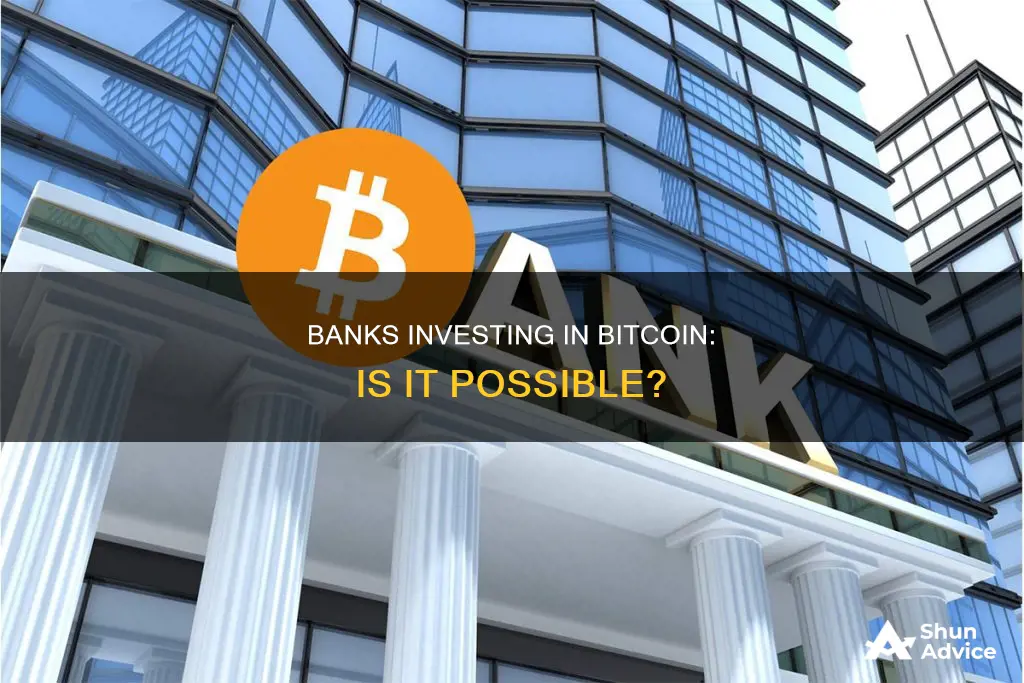
Bitcoin is a decentralised, peer-to-peer digital currency that operates on a distributed ledger called blockchain. It has grown in popularity and usage across North America, with 20% of American adults currently owning crypto. Despite its popularity, many banks are still resistant to Bitcoin due to its volatility and the elevated risks of fraud, loss, and volatility inherent in the cryptocurrency market. However, the number of Bitcoin-friendly banks is growing, and some large banks have launched crypto trading desks. This article will explore the topic of banks investing in Bitcoin by examining the current landscape of banks' relationships with Bitcoin and the potential opportunities and risks associated with this emerging technology.
| Characteristics | Values |
|---|---|
| Banks that accept Bitcoin | Chime Bank, Wirex, Ally Bank, Fidor, Change, Worldcore, Bankera, USAA, Goldman Sachs, Revolut, National Bank of Canada, Simple Bank |
| Banks that ban or limit Bitcoin purchasing | Capital One, TD Bank, PNC Bank, JPMorgan Chase, Bank of America, Citigroup, Discover, Wells Fargo, Commonwealth Bank of Australia, Virgin Money, Toronto-Dominion Bank, Royal Bank of Canada |
| Crypto banks | Bitwala, Coinbase, Wirex |
What You'll Learn

Banks that accept Bitcoin
While most US banks do not allow customers to purchase or exchange any type of cryptocurrency, some banks are catching on to the popularity of Bitcoin and expanding their services accordingly. Here are some banks that accept Bitcoin in some form:
USAA
USAA is a company that handles a range of financial services, including bank accounts, insurance policies, and investment options. It was the first major US bank to invest in a cryptocurrency exchange. USAA members can purchase Bitcoins with USAA debit cards, bank transfers, and bank wire payments. USAA's mobile banking app also allows Coinbase users to check their cryptocurrency balances from their phones.
Ally Bank
Ally Bank is a virtual-only bank that offers 24/7 customer service support. It does not charge any monthly bank maintenance fees, and it offers an annual percentage yield of 1% or greater on savings. Cryptocurrency can be purchased with an Ally Bank debit card, bank transfer, or bank wire. Ally makes it easy to link bank accounts to Coinbase to accomplish these transactions.
Chime
Chime is a financial technology company that offers full virtual bank functionality, including access to over 60,000 ATMs in the United States. Chime does not charge overdraft, monthly, or minimum balance fees, and it offers faster direct deposit payments than most other banking companies. While Chime does not allow Bitcoin transactions with its debit card or through bank wires, it does allow users to use a third-party application called Paxful to directly pay individuals with Bitcoins using their email, phone number, or username.
Goldman Sachs
Goldman Sachs is a multinational investment banking and financial services firm headquartered in New York. While it does not offer checking accounts, customers can access a high-yield online savings account. Goldman Sachs launched an altcoin trading desk and has offered altcoin products since 2018.
Simple Bank
Simple Bank is an American direct bank based in Portland, Oregon. It provides an FDIC-insured checking account to any US citizen through a partnership with The Bancorp and BBVA USA. With a Simple-issued Visa debit card, customers can make bitcoin purchases at any time. Simple Bank collaborates with most bitcoin exchanges and permits direct buy-sell transactions for bitcoin.
Toronto-Dominion Bank (TDB)
While America tightens restrictions on cryptocurrencies, Canada is moving in the opposite direction. The Toronto-Dominion Bank is one of Canada's largest banks, and it allows cryptocurrency credit card purchases as long as the purchase is accepted by Mastercard, Visa, Visa Debit, or Interac. This bank is notable for allowing cross-border banking with the United States, which may simplify the banking process for those with existing accounts in both countries.
National Bank of Canada
The National Bank of Canada still allows bitcoin purchases, even as other major banks in the US, the UK, and Australia have banned credit card purchases for cryptocurrencies.
The Ultimate Guide to Bitcoin Stock ETF Investing
You may want to see also

Banks that ban Bitcoin purchasing
Banks have been resistant to Bitcoin due to its volatility and the risk of fraud, loss, and volatility in the cryptocurrency market. Some banks have blocked transactions involving cryptocurrencies, while others have banned the purchase of bitcoins on their credit cards. Here is a list of banks that have explicitly banned or limited Bitcoin purchasing:
- Capital One: Currently declining credit card transactions for cryptocurrency purchases due to limited mainstream acceptance and elevated risks.
- TD Bank: Blocked transactions involving cryptocurrencies and accused of stopping bitcoin purchasing transactions.
- PNC Bank: Blocked transactions involving cryptocurrencies.
- JPMorgan Chase: Banned the purchase of bitcoins on their credit cards.
- Bank of America: Banned the purchase of bitcoins on their credit cards.
- Citigroup: Banned the purchase of bitcoins on their credit cards.
- Discover: Banned the purchase of bitcoins on their credit cards, with all five of America's largest card issuers now having altcoin bans.
- Virgin Money: Confirmed that customers would no longer be able to use their credit cards to purchase cryptocurrencies.
- Wells Fargo: Allegedly sought to block transfer wires to the bitcoin exchange Bitfinex.
- Commonwealth Bank of Australia: Can refuse any international money transfer meant for facilitating payments with bitcoin or other altcoins, but lawful use of bitcoin is permitted if it complies with the bank's terms and conditions.
- Bank of Montreal: Banned credit and debit card customers from participating in cryptocurrency purchases.
- Toronto Dominion (TD) Bank: Blocked customers from buying digital currencies.
- Royal Bank of Canada (RBC): Allows cryptocurrency transactions only in limited circumstances.
While some banks have banned Bitcoin purchasing, it is important to note that the number of bitcoin-friendly banks is growing, and people can still buy Bitcoin with a bank account or other payment methods.
Invest in Bitcoin: Avoid Startup Fees and Get Started
You may want to see also

Crypto banks
One example of a crypto-friendly bank is Revolut, a UK-based fintech company. Revolut offers an easy-to-use mobile app that supports over 30 cryptocurrencies, including Bitcoin and Ethereum. The platform provides competitive exchange rates and allows users to exchange between different fiat and digital currencies. Additionally, Revolut offers cryptocurrency wallets, enabling users to manage their digital assets alongside traditional money.
Another notable player in the crypto space is Wirex, which offers a payment card in partnership with Mastercard. Wirex stands out for its support of both traditional currencies and a wide range of cryptocurrencies. They offer various plans, including a free option, and users can earn more crypto by upgrading their plans.
Juno, a crypto-friendly banking platform, offers specialized crypto accounts with features like crypto-backed loans, savings, and trading. Juno also provides staking services, allowing users to earn rewards by holding cryptocurrencies. Similarly, Ally Bank, an online-only bank, allows customers to link their accounts to external cryptocurrency exchanges for trading.
Some banks are even venturing into the crypto space by offering crypto-friendly business accounts and asset management services for crypto industry players. For instance, BankProv, a US-based financial institution, facilitates cryptocurrency exchanges and prioritises compliance with crypto regulations and anti-money laundering requirements.
While crypto banks make it easier for individuals and businesses to engage with cryptocurrencies, there are still risks associated with the volatile nature of crypto assets. Additionally, crypto-friendly banks may charge higher fees for crypto services compared to regular wallets, and they may not offer all the features available in decentralised finance (DeFi). Nonetheless, the increasing adoption of crypto by banks indicates a growing acceptance of this new asset class.
The Ultimate Guide to Investing in Bitcoin
You may want to see also

Crypto as a high-risk/high-reward investment
Cryptocurrency is a highly volatile and unregulated investment product. It is often advertised as a high-return investment but should be treated with caution. Crypto is a high-risk investment that may offer higher returns than other investments, but it also puts your money at higher risk. This means that crypto can produce high returns, but you could also lose all the money you invested.
The extreme volatility of cryptocurrencies scares the average investor. Huge increases can be followed by a collapse. Until there is a trusted government body overseeing and regulating this novel toy of wealthy hedge funds, they should be closely watched.
However, cryptocurrency is a disruptive technology that is not going away anytime soon. Traditional banking and investment institutions are beginning to adopt it, allowing the technology to become more mainstream and widely accepted. As more respected institutions embrace cryptocurrency, they must deploy methods to protect themselves and decrease risk and exposure.
There are a few ways to mitigate some of the risks involved in investing in crypto. Due diligence, internal governance, appropriate disclosures, and regulation should all be used to protect your investment. It is also advisable to put no more than 10% of your total net assets in high-risk investments, with the remainder diversified across a range of mainstream investments.
- Tamadoge
- Battle Infinity
- Lucky Block
- Solana
- Silks
Fidelity's Bitcoin Investment: Exploring the Crypto Opportunity
You may want to see also

Crypto's potential to replace central banks
Banks and asset managers are slowly increasing their exposure to cryptocurrencies. For instance, America's oldest bank, Bank of New York Mellon, has announced it will help clients hold and transfer cryptocurrencies. However, many banks still resist Bitcoin due to its volatility, limited mainstream acceptance, and the elevated risks of fraud, loss, and volatility inherent in the cryptocurrency market.
Cryptocurrencies are a potential threat to central banks, and the response from national financial authorities has been to adopt blockchain solutions. Central bank digital currencies (CBDCs) are being explored and developed by many countries. These are backed and controlled by a government and central bank and do not need to be converted to a fiat currency to be usable.
Bitcoin uses a decentralized peer-to-peer ledger system, which means it is not controlled by central banks or governments. It has the potential to become a globally accepted payment method and revolutionize people's access to financial services. However, most governments do not control or recognize it, and central banks cannot influence it.
Some believe that Bitcoin's decentralized system could upend the role of central banks. Central banks are vital to the economy, maintaining employment, stabilizing prices, and helping the financial system in times of crisis. However, critics argue that they have a negative impact on consumers and the economy and are responsible for debilitating recessions.
Bitcoin and other cryptocurrencies can replace fiat currency as a store of value, medium of exchange, and unit of account. Decentralized blockchain-based systems can replace banking with faster transactions, higher security levels, lower fees, and smart contracts.
However, there are several issues with Bitcoin replacing central banks and fiat currencies. Firstly, users need to understand what they are using, and the technology can be complex for those without programming skills. Secondly, graphic user interfaces introduced vulnerabilities that make it easy to steal keys. Thirdly, for Bitcoin to replace central banks, all governments and central banks would need to declare their country's currency unusable. Fourthly, Bitcoin has a limited supply, and because it must be converted to fiat currency to be used, it is subject to inflation. Finally, Bitcoin has not been adopted at a rate that suggests it will replace current financial systems. Instead, it has become a favourite for financial speculators and risk-takers.
Bitcoin vs. Monero: Which Crypto is the Better Investment?
You may want to see also
Frequently asked questions
Yes, banks can invest in Bitcoin. However, many banks are still resistant to Bitcoin due to its volatility, limited mainstream acceptance, and the elevated risks of fraud, loss, and volatility inherent in the cryptocurrency market. Despite this, the number of Bitcoin-friendly banks is growing, and some large banks have launched crypto trading desks.
The main risk of banks investing in Bitcoin is its volatility, which can lead to significant losses. Bitcoin is subject to wild price fluctuations and is not backed by any hard assets, making it a risky investment. Additionally, there is a risk of regulatory intervention, as governments may impose restrictions on cryptocurrencies.
Investing in Bitcoin can provide banks with new revenue streams and increase their market share by attracting new, typically younger customers. It also allows banks to cater to the growing demand for cryptocurrency and offer innovative products and services. Bitcoin can also act as a diversification asset for banks due to its low correlation with traditional asset classes.







